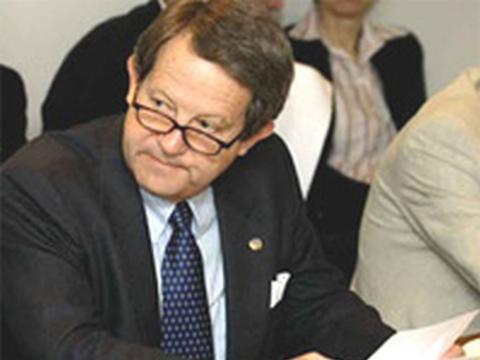Sources close to their Cabenda Hotel offices in Freetown claim that the Executive Representative of the Secretary General (ERSG) might plunge the organisation into an unprecedented chaos if allowed to press ahead with his plans to victimize staff who took part in an industrial action against him in September 2012.The head of UN Integrated Peace-building Mission in Sierra Leone, UNIPSIL, Jens Anders Toyberg-Frandzen is alleged to have embarked on a policy of victimisation ahead of the winding down of the mission’s operations in the country.
It emerged last night that Toyberg-Frandzen was planning to punish some staff members rumoured to have been “too close” to his predecessor, Michael Schulenburg, by closing down their departments in the name of down-sizing UNIPSIL’s activities ahead of their departure.
In its latest resolution on the situation in Sierra Leone, the Security Council requested UNIPSIL “to focus its remaining activities during this mandating period on facilitating political dialogue, including support to the government, particularly related to the planned constitutional review, security sector support and strengthening of human rights institutions and their long-term sustainability”.
One of those likely to be affected feared that it would appear as if the ERSG was bent on attacking the department and its personnel that would play a pivotal role in carrying out this Security Council mandate.
A senior UNIPSIL staff told Politico last night that “Toyberg-Frandzen has signaled that all staff involved in the September strike over poor pay for local staff and discrimination would be thrown out of the institution”.
Our source told us that the ERSG intended to close down the democratic institutions department established by Schulenburg in a manner that could violate the UN policy on “Transitions in the Context of Mission Drawdown or Withdrawal”, which clearly states among other things that “… that missions should undertake a staffing needs assessment to determine the skills required throughout the liquidation phase and fill critical staffing gaps through flexible contractual arrangements…”.
The document also said that “successful national capacity development programs from the outset of the mission mandates will permit national staff to assume greater responsibility throughout and after the transition and make them competitive on the labour market…”
A senior programme officer of a prominent civil society organisation told Politico that “we do not trust the UN in the constitutional review process…because the current posture of UNIPSIL threatens to destroy the trust of citizens over the transition period”.
While the UN chief could not be reached for comments as at press time, Politico is investigating claims of discrimination against national staff and ill-treatment bordering on “racism”.
(C) Politico 11/06/13








